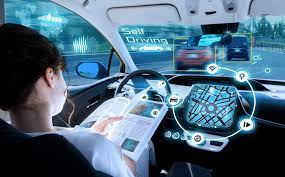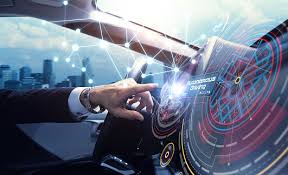Revolutionizing Transportation: The Development of Self-Driving Cars
Self-driving cars have long been a staple of science fiction, but in recent years, they have become a reality. The development of self-driving cars is transforming the transportation industry, providing new opportunities for efficiency, safety, and accessibility. In this article, we will explore the development of self-driving cars and their impact on the future of transportation.
What are Self-Driving Cars?
Self-driving cars, also known as autonomous vehicles, are vehicles that can operate without human intervention. They use a combination of sensors, cameras, and algorithms to navigate roads and traffic, making decisions based on real-time data and analysis.
The development of self-driving cars is a complex and challenging process that involves several key components, including:
Sensors: Self-driving cars use a variety of sensors, including cameras, radar, and lidar, to collect data about their surroundings and navigate roads and traffic.
Algorithms: Self-driving cars use complex algorithms to analyze sensor data and make decisions based on real-time conditions and analysis.
Navigation: Self-driving cars use GPS and mapping technologies to navigate roads and traffic, identifying potential obstacles and hazards and making adjustments to their path as needed.
Safety: Self-driving cars are designed with safety in mind, with features such as emergency braking systems, collision avoidance, and pedestrian detection.

Benefits of Self-Driving Cars
The integration of self-driving cars in transportation provides several benefits for individuals, businesses, and society as a whole. Some of the key benefits include:
Increased Efficiency: Self-driving cars can help to reduce traffic congestion and optimize traffic flow, providing more efficient transportation and reducing travel time.
Improved Safety: Self-driving cars are designed with safety in mind, with features such as emergency braking systems, collision avoidance, and pedestrian detection, reducing the risk of accidents and injuries.
Accessibility: Self-driving cars can provide transportation options for individuals who are unable to drive, such as the elderly or individuals with disabilities, improving accessibility and inclusivity.
Environmental Benefits: Self-driving cars can help to reduce carbon emissions and promote sustainable transportation, improving air quality and reducing the impact of transportation on the environment.
Challenges and Concerns
The development of self-driving cars also raises several challenges and concerns, including:
Technical Challenges: The development of self-driving cars is a complex and challenging process, requiring significant investment in research and development.
Regulatory Challenges: The integration of self-driving cars in transportation raises concerns about regulation and safety, with many governments and organizations calling for increased oversight and regulation.
Ethical Concerns: Self-driving cars raise several ethical concerns, such as the potential for accidents and injuries, accountability and liability, and privacy and security.
Social and Economic Impacts: Self-driving cars have the potential to disrupt the transportation industry and impact employment and urban planning, raising concerns about social and economic impacts.
Conclusion
The development of self-driving cars is a game-changer, providing new and exciting opportunities for transportation and society as a whole. Self-driving cars have the potential to revolutionize the way we travel, providing new avenues for efficiency, safety, accessibility, and sustainability.
As we move forward, it is essential to address the challenges and concerns raised by the integration of self-driving cars in transportation. This can be achieved through increased investment in research and development, enhanced regulation and oversight, and ethical and social considerations.
The development of self-driving cars is transforming the transportation industry, providing new opportunities for efficiency, safety, accessibility, and sustainability. The future is bright, and we can expect to see more advancements and innovation in the years to come. As we move forward, it is essential to harness the power of self-driving cars to revolutionize transportation while upholding social and ethical values.
Furthermore, self-driving cars have the potential to address some of the world’s most pressing transportation issues, such as traffic congestion, road safety, and accessibility. For instance, self-driving cars can help to reduce traffic congestion by optimizing traffic flow and reducing the number of cars on the road. Moreover, self-driving cars can help to reduce the number of accidents and injuries on the road by minimizing the risk of human error.
In addition, self-driving cars can help to address issues of accessibility and inclusivity. For instance, self-driving cars can provide transportation options for individuals who are unable to drive, such as the elderly or individuals with disabilities. Moreover, self-driving cars can help to reduce the cost of transportation, providing more affordable options for individuals and families.
The integration of self-driving cars in society is still in its early stages, and we can expect to see more advancements and innovation in the future. However, it is crucial to ensure that we use these technologies responsibly and ethically to address concerns about safety, regulation, and social and economic impacts. By doing so, we can harness the power of self-driving cars to transform transportation while upholding social and ethical values.

The development of self-driving cars is transforming the transportation industry, providing new opportunities for efficiency, safety, accessibility, and sustainability. Self-driving cars have the potential to revolutionize the way we travel, providing new avenues for efficiency, safety, accessibility, and sustainability. As we move forward, it is essential to address the challenges and concerns raised by the integration of self-driving cars in transportation while harnessing the power of these technologies to revolutionize transportation while upholding social and ethical values.
Moreover, self-driving cars have the potential to create new business opportunities and promote innovation. For instance, the development of self-driving cars has led to the emergence of new industries such as autonomous ride-sharing services and delivery services, providing new opportunities for entrepreneurs and businesses. Moreover, the integration of self-driving cars in transportation can encourage innovation and creativity in the development of new technologies and services.
The development of self-driving cars also raises concerns about the impact on employment and urban planning. The integration of self-driving cars in transportation has the potential to disrupt the transportation industry and impact employment in sectors such as driving and logistics. Moreover, the introduction of self-driving cars in cities can impact urban planning, with potential changes in traffic flow and parking requirements.
To address these concerns, it is essential to ensure that the integration of self-driving cars in transportation is done responsibly and ethically. This can be achieved through the development of regulations and oversight to manage the impact of self-driving cars on employment and urban planning. Moreover, it is crucial to promote education and training to ensure that individuals are equipped with the skills needed to adapt to the changing transportation landscape.
The integration of self-driving cars in transportation is transforming the transportation industry, providing new opportunities for efficiency, safety, accessibility, sustainability, and innovation. However, it is crucial to address the challenges and concerns raised by the introduction of self-driving cars, such as safety, regulation, ethics, and social and economic impacts. By doing so, we can harness the power of self-driving cars to revolutionize transportation while upholding social and ethical values.















